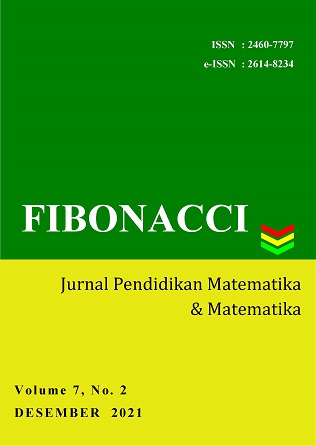PENGEMBANGAN RTA YANG ANDAL DAN VALID UNTUK CALON GURU MATEMATIKA
Main Article Content
Abstract
Article Details
Authors who publish with this journal agree to the following terms:
- Authors retain copyright and grant the journal right of first publication with the work simultaneously licensed under a Creative Commons Attribution License that allows others to share the work with an acknowledgement of the work's authorship and initial publication in this journal.
- Authors are able to enter into separate, additional contractual arrangements for the non-exclusive distribution of the journal's published version of the work (e.g., post it to an institutional repository or publish it in a book), with an acknowledgement of its initial publication in this journal.
- Authors are permitted and encouraged to post their work online (e.g., in institutional repositories or on their website) prior to and during the submission process, as it can lead to productive exchanges, as well as earlier and greater citation of published work (See The Effect of Open Access).
References
Ariany, R. L., Widiastuti, T. T., Jauhari, A. L. R., & Fardillah, F. 2021. Classification of Student’s Mathematical Reflective Thinking in Calculus Class. Journal of Physics: Conference Series, 1764(1). https://doi.org/10.1088/1742-6596/1764/1/012117
Başol, G. 2013. Reflective Thinking Scale : A Validity and Reliability Study *. Educational Sciences: Theory & Practice, 13(2), 941–946.
Can, B. T., & Yildirim, C. 2014. The instrument for determining the levels of reflective thinking among elementary school students. Educational Research and Review, 9(1), 9–16. https://doi.org/10.5897/ERR12.093
Choy, S. C., Yim, J. S., & Tan, P. L. 2017. Reflective thinking among preservice teachers : A Malaysian perspective. Issues in Educational Research, 27(2), 234–251.
Demir, S. 2015. Evaluation of Critical Thinking and Reflective Thinking Skills among Science Teacher Candidates. Journal of Education and Practice, 6(18), 17–22.
Dervent, F. 2015. The effect of reflective thinking on the teaching practices of preservice physical education teachers. Issues in Educational Research, 25(3), 260–275.
Dewey, J. 1933. How We Think : A Restatement of The Relation of Reflective Thinking to The Educative process. Boston: D.C Heath and Company.
Ghanizadeh, A., & Jahedizadeh, S. 2017. Validating the Persian Version of Reflective Thinking Questionnaire and Probing Iranian University Students ’ Reflective Thinking and Academic Achievement. International Journal of Instruction, 10(3), 209–226.
Kember, D., Leung, D., Jones, D., & Loke, A. 2000. development of a questionnaire to measure the level of reflective thinking. Assessment & Evaluation in Higher Education, 25(4), 381–395.
Mirzaei, F., Aliah, F., & Kashefi, H. 2014. Assessing and Improving Reflective Thinking of Experienced and Inexperienced Teachers. Procedia - Social and Behavioral Sciences, 141, 633–639. https://doi.org/10.1016/j.sbspro.2014.05.111
Schon, D. A. 1983. The Reflective Practice : How Profesional Think in Action. New York: Basic Books.
Schon, D. A. 1987. Educating the reflective practitioner. San Francisco: Jossey-Bass.
Suharna, H. 2012. Berpikir Reflektif (Reflective Thinking) Siswa SD Berkemampuan Matematika Tinggi Dalam Masalah Pecahan. In Seminar Nasional Matematika dan Pendidikan Matematika (pp. 978–979). Yogyakarta.
Tutticci, N. F. 201). “Measuring Reflective Thinking and Self - Efficacy After High Fidelity Simulation to Optimise The Reflective Capacity of Final Year Nursing Students.” Queensland University of Technology.
Widiyasari, R., Kusumah, Y. S., & Nurlaelah, E. 2020. Analisis Kemampuan Berpikir Reflektif Mahasiswa Calon Guru Matematika pada Mata Kuliah Program Linier. Fibonacci, 6(1), 67–76.

